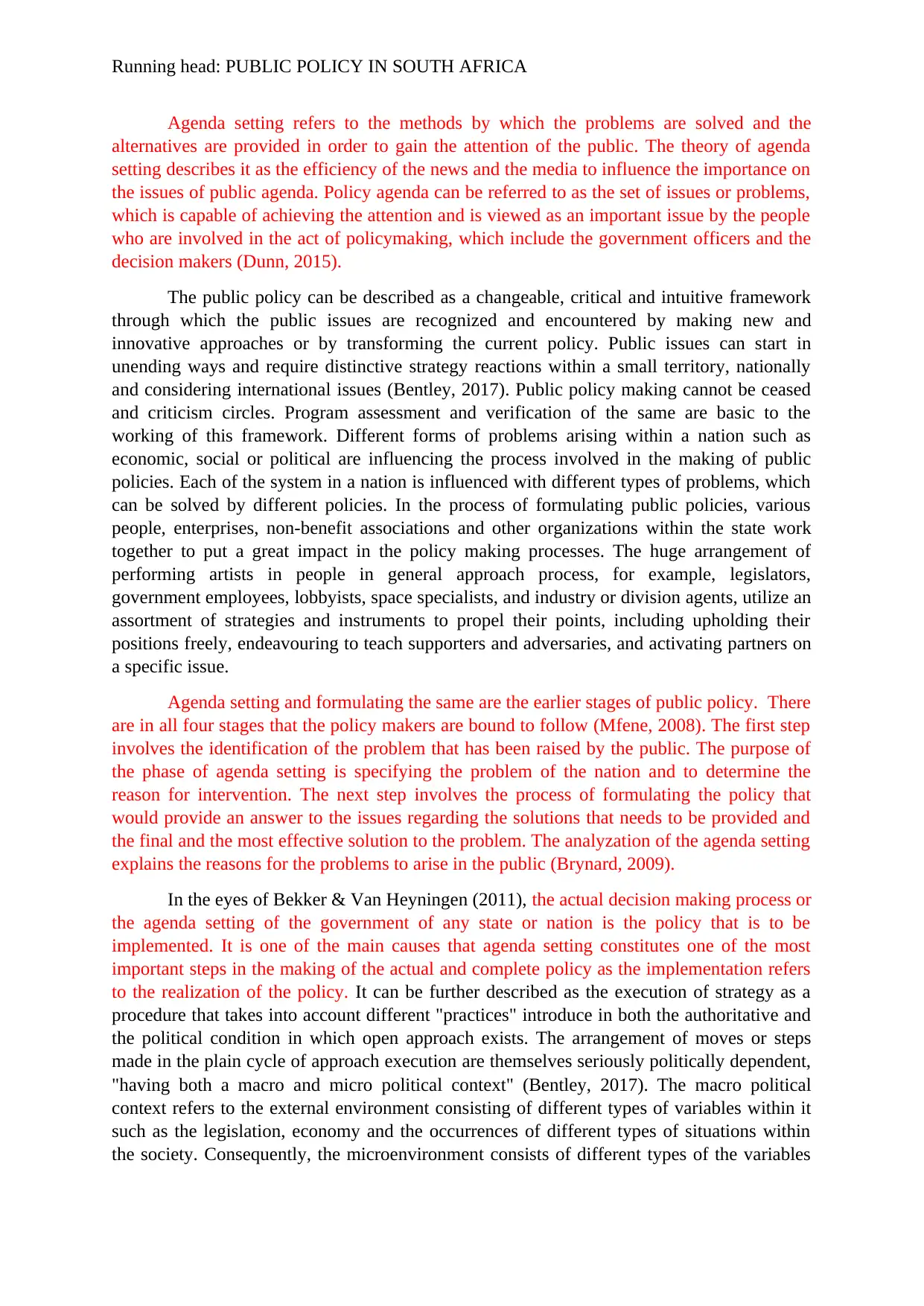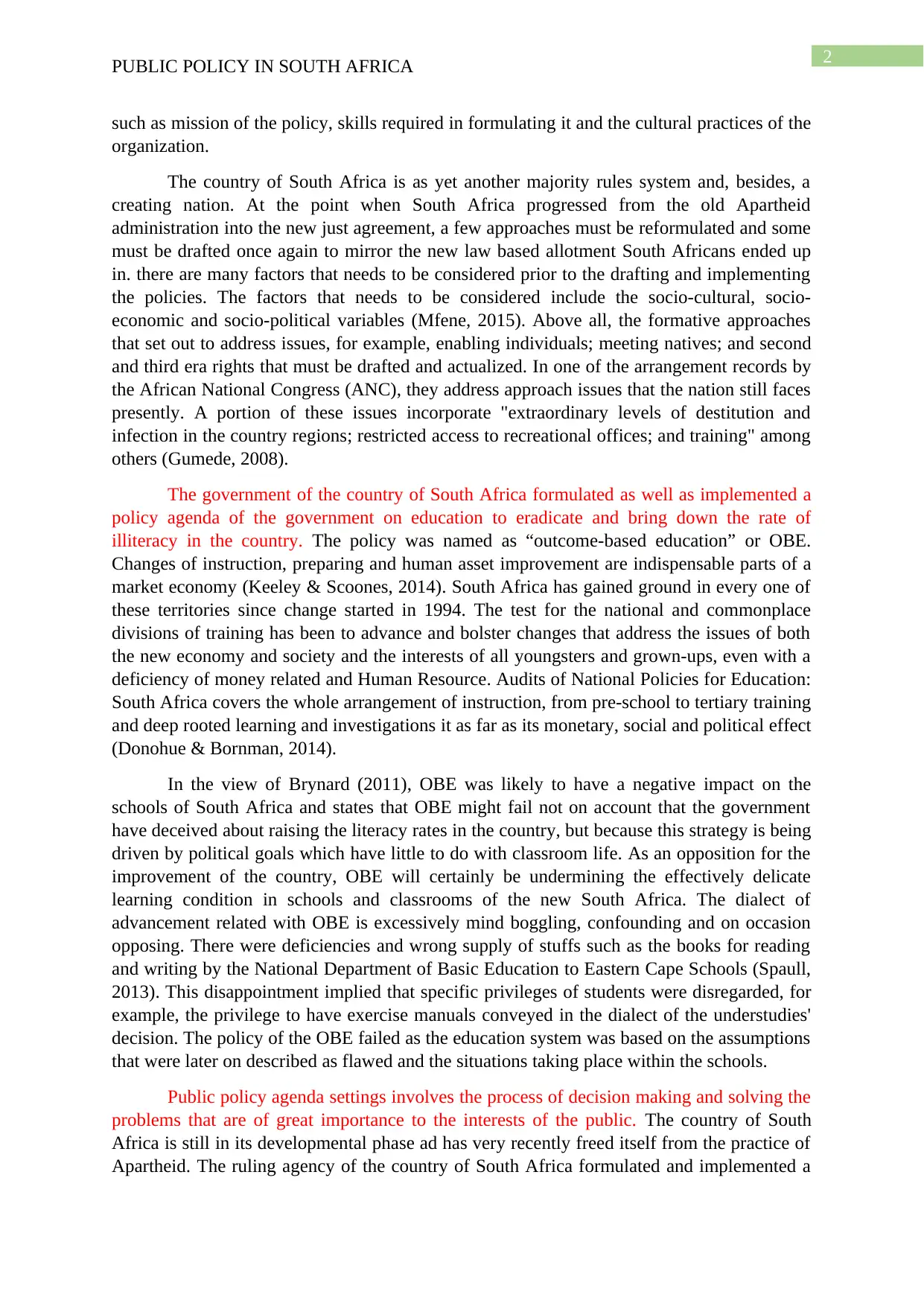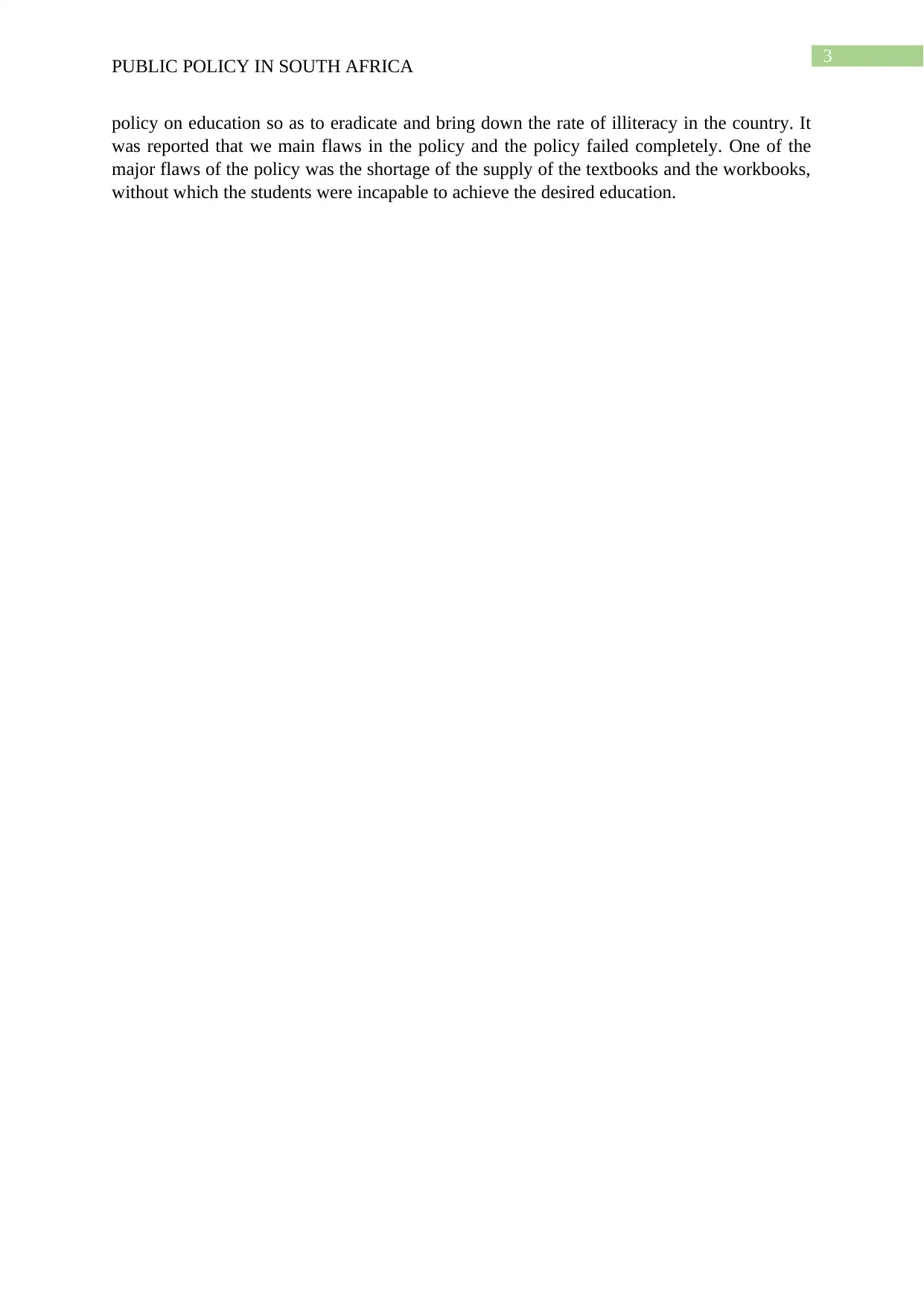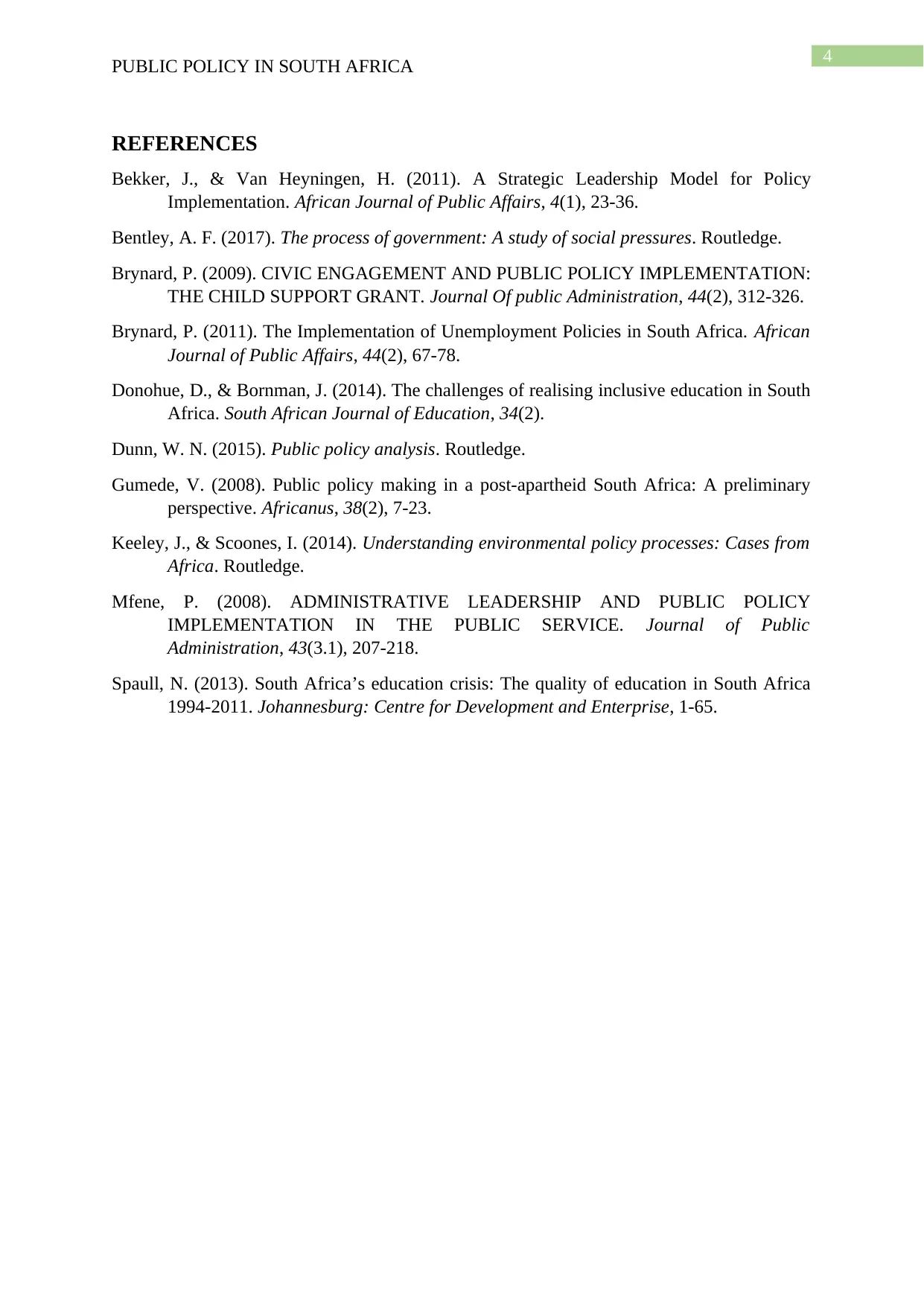Public Policy in South Africa: Examining Agenda Setting & Challenges
VerifiedAdded on 2023/06/09
|4
|1718
|386
Essay
AI Summary
This essay provides an analysis of public policy in South Africa, with a focus on agenda setting and the challenges of policy implementation. It discusses the various stages of public policy formulation, including problem identification and solution development, and highlights the importance of considering socio-cultural, socio-economic, and socio-political factors. The essay uses the example of South Africa's 'outcome-based education' (OBE) policy to illustrate the complexities and potential pitfalls of policy implementation, noting that the policy failed due to flawed assumptions, shortages of resources, and a disconnect between political goals and classroom realities. The essay concludes by emphasizing the importance of effective decision-making and problem-solving in addressing public interests, particularly in a developing nation like South Africa transitioning from Apartheid.

Running head: PUBLIC POLICY IN SOUTH AFRICA
Agenda setting refers to the methods by which the problems are solved and the
alternatives are provided in order to gain the attention of the public. The theory of agenda
setting describes it as the efficiency of the news and the media to influence the importance on
the issues of public agenda. Policy agenda can be referred to as the set of issues or problems,
which is capable of achieving the attention and is viewed as an important issue by the people
who are involved in the act of policymaking, which include the government officers and the
decision makers (Dunn, 2015).
The public policy can be described as a changeable, critical and intuitive framework
through which the public issues are recognized and encountered by making new and
innovative approaches or by transforming the current policy. Public issues can start in
unending ways and require distinctive strategy reactions within a small territory, nationally
and considering international issues (Bentley, 2017). Public policy making cannot be ceased
and criticism circles. Program assessment and verification of the same are basic to the
working of this framework. Different forms of problems arising within a nation such as
economic, social or political are influencing the process involved in the making of public
policies. Each of the system in a nation is influenced with different types of problems, which
can be solved by different policies. In the process of formulating public policies, various
people, enterprises, non-benefit associations and other organizations within the state work
together to put a great impact in the policy making processes. The huge arrangement of
performing artists in people in general approach process, for example, legislators,
government employees, lobbyists, space specialists, and industry or division agents, utilize an
assortment of strategies and instruments to propel their points, including upholding their
positions freely, endeavouring to teach supporters and adversaries, and activating partners on
a specific issue.
Agenda setting and formulating the same are the earlier stages of public policy. There
are in all four stages that the policy makers are bound to follow (Mfene, 2008). The first step
involves the identification of the problem that has been raised by the public. The purpose of
the phase of agenda setting is specifying the problem of the nation and to determine the
reason for intervention. The next step involves the process of formulating the policy that
would provide an answer to the issues regarding the solutions that needs to be provided and
the final and the most effective solution to the problem. The analyzation of the agenda setting
explains the reasons for the problems to arise in the public (Brynard, 2009).
In the eyes of Bekker & Van Heyningen (2011), the actual decision making process or
the agenda setting of the government of any state or nation is the policy that is to be
implemented. It is one of the main causes that agenda setting constitutes one of the most
important steps in the making of the actual and complete policy as the implementation refers
to the realization of the policy. It can be further described as the execution of strategy as a
procedure that takes into account different "practices" introduce in both the authoritative and
the political condition in which open approach exists. The arrangement of moves or steps
made in the plain cycle of approach execution are themselves seriously politically dependent,
"having both a macro and micro political context" (Bentley, 2017). The macro political
context refers to the external environment consisting of different types of variables within it
such as the legislation, economy and the occurrences of different types of situations within
the society. Consequently, the microenvironment consists of different types of the variables
Agenda setting refers to the methods by which the problems are solved and the
alternatives are provided in order to gain the attention of the public. The theory of agenda
setting describes it as the efficiency of the news and the media to influence the importance on
the issues of public agenda. Policy agenda can be referred to as the set of issues or problems,
which is capable of achieving the attention and is viewed as an important issue by the people
who are involved in the act of policymaking, which include the government officers and the
decision makers (Dunn, 2015).
The public policy can be described as a changeable, critical and intuitive framework
through which the public issues are recognized and encountered by making new and
innovative approaches or by transforming the current policy. Public issues can start in
unending ways and require distinctive strategy reactions within a small territory, nationally
and considering international issues (Bentley, 2017). Public policy making cannot be ceased
and criticism circles. Program assessment and verification of the same are basic to the
working of this framework. Different forms of problems arising within a nation such as
economic, social or political are influencing the process involved in the making of public
policies. Each of the system in a nation is influenced with different types of problems, which
can be solved by different policies. In the process of formulating public policies, various
people, enterprises, non-benefit associations and other organizations within the state work
together to put a great impact in the policy making processes. The huge arrangement of
performing artists in people in general approach process, for example, legislators,
government employees, lobbyists, space specialists, and industry or division agents, utilize an
assortment of strategies and instruments to propel their points, including upholding their
positions freely, endeavouring to teach supporters and adversaries, and activating partners on
a specific issue.
Agenda setting and formulating the same are the earlier stages of public policy. There
are in all four stages that the policy makers are bound to follow (Mfene, 2008). The first step
involves the identification of the problem that has been raised by the public. The purpose of
the phase of agenda setting is specifying the problem of the nation and to determine the
reason for intervention. The next step involves the process of formulating the policy that
would provide an answer to the issues regarding the solutions that needs to be provided and
the final and the most effective solution to the problem. The analyzation of the agenda setting
explains the reasons for the problems to arise in the public (Brynard, 2009).
In the eyes of Bekker & Van Heyningen (2011), the actual decision making process or
the agenda setting of the government of any state or nation is the policy that is to be
implemented. It is one of the main causes that agenda setting constitutes one of the most
important steps in the making of the actual and complete policy as the implementation refers
to the realization of the policy. It can be further described as the execution of strategy as a
procedure that takes into account different "practices" introduce in both the authoritative and
the political condition in which open approach exists. The arrangement of moves or steps
made in the plain cycle of approach execution are themselves seriously politically dependent,
"having both a macro and micro political context" (Bentley, 2017). The macro political
context refers to the external environment consisting of different types of variables within it
such as the legislation, economy and the occurrences of different types of situations within
the society. Consequently, the microenvironment consists of different types of the variables
Paraphrase This Document
Need a fresh take? Get an instant paraphrase of this document with our AI Paraphraser

2
PUBLIC POLICY IN SOUTH AFRICA
such as mission of the policy, skills required in formulating it and the cultural practices of the
organization.
The country of South Africa is as yet another majority rules system and, besides, a
creating nation. At the point when South Africa progressed from the old Apartheid
administration into the new just agreement, a few approaches must be reformulated and some
must be drafted once again to mirror the new law based allotment South Africans ended up
in. there are many factors that needs to be considered prior to the drafting and implementing
the policies. The factors that needs to be considered include the socio-cultural, socio-
economic and socio-political variables (Mfene, 2015). Above all, the formative approaches
that set out to address issues, for example, enabling individuals; meeting natives; and second
and third era rights that must be drafted and actualized. In one of the arrangement records by
the African National Congress (ANC), they address approach issues that the nation still faces
presently. A portion of these issues incorporate "extraordinary levels of destitution and
infection in the country regions; restricted access to recreational offices; and training" among
others (Gumede, 2008).
The government of the country of South Africa formulated as well as implemented a
policy agenda of the government on education to eradicate and bring down the rate of
illiteracy in the country. The policy was named as “outcome-based education” or OBE.
Changes of instruction, preparing and human asset improvement are indispensable parts of a
market economy (Keeley & Scoones, 2014). South Africa has gained ground in every one of
these territories since change started in 1994. The test for the national and commonplace
divisions of training has been to advance and bolster changes that address the issues of both
the new economy and society and the interests of all youngsters and grown-ups, even with a
deficiency of money related and Human Resource. Audits of National Policies for Education:
South Africa covers the whole arrangement of instruction, from pre-school to tertiary training
and deep rooted learning and investigations it as far as its monetary, social and political effect
(Donohue & Bornman, 2014).
In the view of Brynard (2011), OBE was likely to have a negative impact on the
schools of South Africa and states that OBE might fail not on account that the government
have deceived about raising the literacy rates in the country, but because this strategy is being
driven by political goals which have little to do with classroom life. As an opposition for the
improvement of the country, OBE will certainly be undermining the effectively delicate
learning condition in schools and classrooms of the new South Africa. The dialect of
advancement related with OBE is excessively mind boggling, confounding and on occasion
opposing. There were deficiencies and wrong supply of stuffs such as the books for reading
and writing by the National Department of Basic Education to Eastern Cape Schools (Spaull,
2013). This disappointment implied that specific privileges of students were disregarded, for
example, the privilege to have exercise manuals conveyed in the dialect of the understudies'
decision. The policy of the OBE failed as the education system was based on the assumptions
that were later on described as flawed and the situations taking place within the schools.
Public policy agenda settings involves the process of decision making and solving the
problems that are of great importance to the interests of the public. The country of South
Africa is still in its developmental phase ad has very recently freed itself from the practice of
Apartheid. The ruling agency of the country of South Africa formulated and implemented a
PUBLIC POLICY IN SOUTH AFRICA
such as mission of the policy, skills required in formulating it and the cultural practices of the
organization.
The country of South Africa is as yet another majority rules system and, besides, a
creating nation. At the point when South Africa progressed from the old Apartheid
administration into the new just agreement, a few approaches must be reformulated and some
must be drafted once again to mirror the new law based allotment South Africans ended up
in. there are many factors that needs to be considered prior to the drafting and implementing
the policies. The factors that needs to be considered include the socio-cultural, socio-
economic and socio-political variables (Mfene, 2015). Above all, the formative approaches
that set out to address issues, for example, enabling individuals; meeting natives; and second
and third era rights that must be drafted and actualized. In one of the arrangement records by
the African National Congress (ANC), they address approach issues that the nation still faces
presently. A portion of these issues incorporate "extraordinary levels of destitution and
infection in the country regions; restricted access to recreational offices; and training" among
others (Gumede, 2008).
The government of the country of South Africa formulated as well as implemented a
policy agenda of the government on education to eradicate and bring down the rate of
illiteracy in the country. The policy was named as “outcome-based education” or OBE.
Changes of instruction, preparing and human asset improvement are indispensable parts of a
market economy (Keeley & Scoones, 2014). South Africa has gained ground in every one of
these territories since change started in 1994. The test for the national and commonplace
divisions of training has been to advance and bolster changes that address the issues of both
the new economy and society and the interests of all youngsters and grown-ups, even with a
deficiency of money related and Human Resource. Audits of National Policies for Education:
South Africa covers the whole arrangement of instruction, from pre-school to tertiary training
and deep rooted learning and investigations it as far as its monetary, social and political effect
(Donohue & Bornman, 2014).
In the view of Brynard (2011), OBE was likely to have a negative impact on the
schools of South Africa and states that OBE might fail not on account that the government
have deceived about raising the literacy rates in the country, but because this strategy is being
driven by political goals which have little to do with classroom life. As an opposition for the
improvement of the country, OBE will certainly be undermining the effectively delicate
learning condition in schools and classrooms of the new South Africa. The dialect of
advancement related with OBE is excessively mind boggling, confounding and on occasion
opposing. There were deficiencies and wrong supply of stuffs such as the books for reading
and writing by the National Department of Basic Education to Eastern Cape Schools (Spaull,
2013). This disappointment implied that specific privileges of students were disregarded, for
example, the privilege to have exercise manuals conveyed in the dialect of the understudies'
decision. The policy of the OBE failed as the education system was based on the assumptions
that were later on described as flawed and the situations taking place within the schools.
Public policy agenda settings involves the process of decision making and solving the
problems that are of great importance to the interests of the public. The country of South
Africa is still in its developmental phase ad has very recently freed itself from the practice of
Apartheid. The ruling agency of the country of South Africa formulated and implemented a

3
PUBLIC POLICY IN SOUTH AFRICA
policy on education so as to eradicate and bring down the rate of illiteracy in the country. It
was reported that we main flaws in the policy and the policy failed completely. One of the
major flaws of the policy was the shortage of the supply of the textbooks and the workbooks,
without which the students were incapable to achieve the desired education.
PUBLIC POLICY IN SOUTH AFRICA
policy on education so as to eradicate and bring down the rate of illiteracy in the country. It
was reported that we main flaws in the policy and the policy failed completely. One of the
major flaws of the policy was the shortage of the supply of the textbooks and the workbooks,
without which the students were incapable to achieve the desired education.
⊘ This is a preview!⊘
Do you want full access?
Subscribe today to unlock all pages.

Trusted by 1+ million students worldwide

4
PUBLIC POLICY IN SOUTH AFRICA
REFERENCES
Bekker, J., & Van Heyningen, H. (2011). A Strategic Leadership Model for Policy
Implementation. African Journal of Public Affairs, 4(1), 23-36.
Bentley, A. F. (2017). The process of government: A study of social pressures. Routledge.
Brynard, P. (2009). CIVIC ENGAGEMENT AND PUBLIC POLICY IMPLEMENTATION:
THE CHILD SUPPORT GRANT. Journal Of public Administration, 44(2), 312-326.
Brynard, P. (2011). The Implementation of Unemployment Policies in South Africa. African
Journal of Public Affairs, 44(2), 67-78.
Donohue, D., & Bornman, J. (2014). The challenges of realising inclusive education in South
Africa. South African Journal of Education, 34(2).
Dunn, W. N. (2015). Public policy analysis. Routledge.
Gumede, V. (2008). Public policy making in a post-apartheid South Africa: A preliminary
perspective. Africanus, 38(2), 7-23.
Keeley, J., & Scoones, I. (2014). Understanding environmental policy processes: Cases from
Africa. Routledge.
Mfene, P. (2008). ADMINISTRATIVE LEADERSHIP AND PUBLIC POLICY
IMPLEMENTATION IN THE PUBLIC SERVICE. Journal of Public
Administration, 43(3.1), 207-218.
Spaull, N. (2013). South Africa’s education crisis: The quality of education in South Africa
1994-2011. Johannesburg: Centre for Development and Enterprise, 1-65.
PUBLIC POLICY IN SOUTH AFRICA
REFERENCES
Bekker, J., & Van Heyningen, H. (2011). A Strategic Leadership Model for Policy
Implementation. African Journal of Public Affairs, 4(1), 23-36.
Bentley, A. F. (2017). The process of government: A study of social pressures. Routledge.
Brynard, P. (2009). CIVIC ENGAGEMENT AND PUBLIC POLICY IMPLEMENTATION:
THE CHILD SUPPORT GRANT. Journal Of public Administration, 44(2), 312-326.
Brynard, P. (2011). The Implementation of Unemployment Policies in South Africa. African
Journal of Public Affairs, 44(2), 67-78.
Donohue, D., & Bornman, J. (2014). The challenges of realising inclusive education in South
Africa. South African Journal of Education, 34(2).
Dunn, W. N. (2015). Public policy analysis. Routledge.
Gumede, V. (2008). Public policy making in a post-apartheid South Africa: A preliminary
perspective. Africanus, 38(2), 7-23.
Keeley, J., & Scoones, I. (2014). Understanding environmental policy processes: Cases from
Africa. Routledge.
Mfene, P. (2008). ADMINISTRATIVE LEADERSHIP AND PUBLIC POLICY
IMPLEMENTATION IN THE PUBLIC SERVICE. Journal of Public
Administration, 43(3.1), 207-218.
Spaull, N. (2013). South Africa’s education crisis: The quality of education in South Africa
1994-2011. Johannesburg: Centre for Development and Enterprise, 1-65.
1 out of 4
Related Documents
Your All-in-One AI-Powered Toolkit for Academic Success.
+13062052269
info@desklib.com
Available 24*7 on WhatsApp / Email
![[object Object]](/_next/static/media/star-bottom.7253800d.svg)
Unlock your academic potential
Copyright © 2020–2025 A2Z Services. All Rights Reserved. Developed and managed by ZUCOL.




